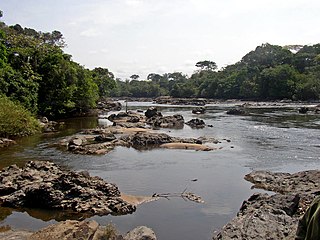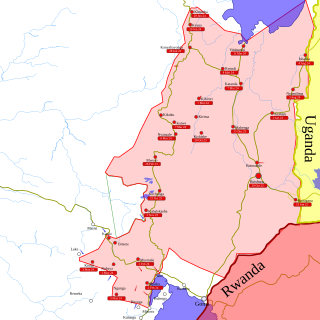Related Research Articles

The Okapi Wildlife Reserve is a wildlife reserve in the Ituri Forest in the north-east of the Democratic Republic of the Congo, near the borders with South Sudan and Uganda. At approximately 14,000 km2, it covers approximately one-fifth of the area of the forest. In 1996, the Okapi Wildlife Reserve was designated a UNESCO World Heritage Site, due to its large population of endangered okapis and its high overall biodiversity.

The Allied Democratic Forces is an Islamist rebel group in Uganda and the Democratic Republic of the Congo (DRC). It considered a terrorist organisation by the Ugandan government and the United States. It was originally based in western Uganda but has expanded into the neighbouring DRC. Most Ugandan ADF fighters are Muslims from the Baganda and Basoga ethnic groups.

The Ituri conflict is an ongoing low intensity asymmetrical conflict between the agriculturalist Lendu and pastoralist Hema ethnic groups in the Ituri region of the north-eastern Democratic Republic of the Congo (DRC). While the two groups had fought since as early as 1972, the name "Ituri conflict" refers to the period of intense violence between 1999 and 2003. Armed conflict continues to the present day.

The Kivu conflict is an umbrella term for a series of protracted armed conflicts in the North Kivu and South Kivu provinces in the eastern Democratic Republic of the Congo which have occurred since the end of the Second Congo War. Including neighboring Ituri province, there are more than 120 different armed groups active in the eastern Democratic Republic of Congo. Currently, some of the most active rebel groups include the Allied Democratic Forces, the Cooperative for the Development of the Congo, the March 23 Movement, and many local Mai Mai militias. In addition to rebel groups and the governmental FARDC troops, a number of national and international organizations have intervened militarily in the conflict, including the United Nations force known as MONUSCO, and an East African Community regional force.

The March 23 Movement, often abbreviated as M23 and also known as the Congolese Revolutionary Army, is a Congolese rebel military group. Based in eastern areas of the Democratic Republic of the Congo (DRC), it operates mainly in the province of North Kivu, which borders both Uganda and Rwanda. The M23 rebellion of 2012 to 2013 against the DRC government led to the displacement of large numbers of people. On 20 November 2012, M23 took control of Goma, a provincial capital with a population of a million people, but it was requested to evacuate it by the International Conference on the Great Lakes Region because the DRC government had finally agreed to negotiate. In late 2012, Congolese troops, along with UN troops, retook control of Goma, and M23 announced a ceasefire and said that it wanted to resume peace talks.

Bunyakiri is a town located in the high plateau of Kalehe Territory in the South Kivu Province in the eastern region of the Democratic Republic of the Congo (DRC). Bunyakiri is nearby the Bulehe and Mulamba villages. It is mainly inhabited by Tembo, Havu, Twa and Hunde ethnic groups.

The Allied Democratic Forces insurgency is an ongoing conflict waged by the Allied Democratic Forces in Uganda and the Democratic Republic of the Congo, against the governments of those two countries and the MONUSCO. The insurgency began in 1996, intensifying in 2013, resulting in hundreds of deaths. The ADF is known to currently control a number of hidden camps which are home to about 2,000 people; in these camps, the ADF operates as a proto-state with "an internal security service, a prison, health clinics, and an orphanage" as well as schools for boys and girls.

Lubero is a town in the North Kivu Province of the Democratic Republic of the Congo. It is the administrative center of the Lubero Territory. Following the surrender of the Mai-Mai fighters in 2021, construction of a new market began in 2022, involving the mayor, ex-soldiers, "young people at risk and the vulnerable women". As of March 2014, the population of Lubero is not publicly known.

The Katanga insurgency is an ongoing rebellion by a number of rebel groups in the Democratic Republic of the Congo, some of which aim for the creation of a separate state within Katanga. While the insurgency has been active in various forms since 1963, insurgent groups have recently redoubled their efforts after the 2011 jail break that freed Gédéon Kyungu Mutanga, who commanded the majority of the Katangese separatist groups until his surrender to Congolese authorities in October 2016.
The following lists events that happened during 2015 in the Democratic Republic of the Congo.

The National Coalition of the People for the Sovereignty of Congo, and also known as the Alliance of Article 64, is an armed rebel coalition in the east of the Democratic Republic of the Congo. The group is a coalition of around 12 different Mai-Mai groups in and around South Kivu province. It was formed on 30 June 2017, symbolically Congolese Independence Day.
The 2017 CNPSC offensive was a military offensive launched by rebels of the National Coalition of the People for the Sovereignty of Congo (CNPSC) on 30 June 2017 against security forces of the Democratic Republic of the Congo and MONUSCO. The goal of the offensive was to capture major settlements, mainly in South Kivu province in order to raise support for a popular uprising against then-president Joseph Kabila, who the coalition had deemed as an illegitimate president.
Mai-Mai Kyandenga is a Mai-Mai armed group operating in north-eastern Democratic Republic of the Congo. It claims to protect the local population of Beni Territory and their land. It still remains unclear what the actual goal of the group is and how much it has in connection with the Union of Patriots for the Liberation of Congo (ULPC), Allied Democratic Forces (ADF), and other Mai-Mai groups operating in the area.
Events in the year 2021 in the Republic of the Congo.

In late March 2022, the March 23 Movement (M23), supported by Rwanda, launched an offensive in North Kivu against the Armed Forces of the Democratic Republic of the Congo (FARDC) and MONUSCO. The fighting displaced hundreds of thousands of civilians and caused renewed tensions between the Democratic Republic of the Congo and Rwanda.
Yusufu Eric Mboneza, more commonly called Yusuf Mboneza, is or was a Congolese military officer and rebel. During his career he served in the Rally for Congolese Democracy, the National Congress for the Defence of the People, the Armed Forces of the Democratic Republic of the Congo, and finally the March 23 Movement.
Events of the year 2024 in the Democratic Republic of the Congo.

The Western DR Congo clashes are a series of attacks by Mobondo militia on armed forces and Teke civilians which started in June 2022. The conflict has an ethnic component, as the Mobondo is mainly recruited from Yaka and other ethnic groups that are migrating into territories traditionally inhabited by Teke.
Operation Shujaa is an ongoing military offensive conducted by the Democratic Republic of the Congo and Uganda against insurgent forces in Kivu and Ituri, mainly Islamic State (IS) affiliates and the Allied Democratic Forces (ADF). Launched in November 2021, it has resulted in significant losses for the targeted rebel forces and substantially reduced their activity. At times, the government forces engaged in Operation Shujaa have also fought non-ADF/IS rebel groups.

The Bashali Chiefdom is a chiefdom located in the Masisi Territory of North Kivu Province in the eastern region of the Democratic Republic of the Congo (DRC). Topographically, it is bounded to the east by the Virunga National Park, to the north by the Bwito Chiefdom of Rutshuru Territory, to the northwest by Walikale Territory, to the south by the Bahunde Chiefdom, and to the west by the Osso sector. Encompassing a total area of 1,582 square kilometers, the chiefdom is the administrative and sociopolitical structure for the Hunde ethnic group and is administratively subdivided into two groupements: Bashali-Mokoto and Bashali-Kaembe. Kitchanga, the urban center and administrative capital of the Bashali-Mokoto groupement, is the most densely populated locality within the chiefdom.
References
- ↑ "Deadly poaching kingpin surrenders in the Congo". Wildlife News. Archived from the original on 16 April 2014. Retrieved 16 April 2014.
- ↑ "United Nations Official Document".
- ↑ Jones, Peter (14 April 2014). "Congo militia chief 'Morgan' killed in army firefight - government". UK Reuters. Archived from the original on March 6, 2016. Retrieved 16 April 2014.
- ↑ "U.N. seeks to locate followers of slain Congo warlord". Thomson Reuters Foundation. Retrieved 16 April 2014.